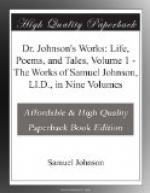XXVII.—To MRS. THRALE.
Edinburgh, Nov. 12, 1773.
DEAREST MADAM,—Among the possibilities of evil, which my imagination suggested at this distance, I missed that which has really happened. I never had much hope of a will in your favour, but was willing to believe that no will would have been made. The event is now irrevocable; it remains only to bear it. Not to wish it had been different, is impossible; but as the wish is painful without use, it is not prudent, perhaps, not lawful, to indulge it. As life, and vigour of mind, and sprightliness of imagination, and flexibility of attention, are given us for valuable and useful purposes, we must not think ourselves at liberty to squander life, to enervate intellectual strength, to cloud our thoughts, or fix our attention, when, by all this expense, we know that no good can be produced. Be alone as little as you can; when you are alone, do not suffer your thoughts to dwell on what you might have done, to prevent this disappointment. You, perhaps, could not have done what you imagine, or might have done it without effect. But even to think in the most reasonable manner, is, for the present, not so useful, as not to think. Remit yourself solemnly into the hands of God, and then turn your mind upon the business and amusements which lie before you. “All is best,” says Chene, “as it has been, excepting the errours of our own free will.” Burton concludes his long book upon Melancholy, with this important precept: “Be not solitary; be not idle.” Remember Chene’s position, and observe Burton’s precept.
We came hither on the ninth of this month. I long to come under your care, but, for some days, cannot decently get away. They congratulate our return, as if we had been with Phipps, or Banks; I am ashamed of their salutations.
I have been able to collect very little for Queeney’s cabinet; but she will not want toys now, she is so well employed. I wish her success; and am not without some thought of becoming her schoolfellow. I have got an Italian Rasselas.
Surely my dear Lucy will recover; I wish, I could do her good. I love her very much; and should love another godchild, if I might have the honour of standing to the next baby. I am, &c.
XXVIII.—To MRS. THRALE.
Edinburgh, Nov. 18, 1773.
MY DEAREST MISTRESS,—This is the last letter that I shall write; while you are reading it, I shall be coming home.
I congratulate you upon your boy; but you must not think that I will love him, all at once, as well as I love Harry; for Harry, you know, is so rational. I shall love him by degrees.
Poor, pretty, dear Lucy! Can nothing do her good? I am sorry to lose her. But, if she must be taken from us, let us resign her, with confidence, into the hands of him who knows, and who only knows, what is best both for us and her.




